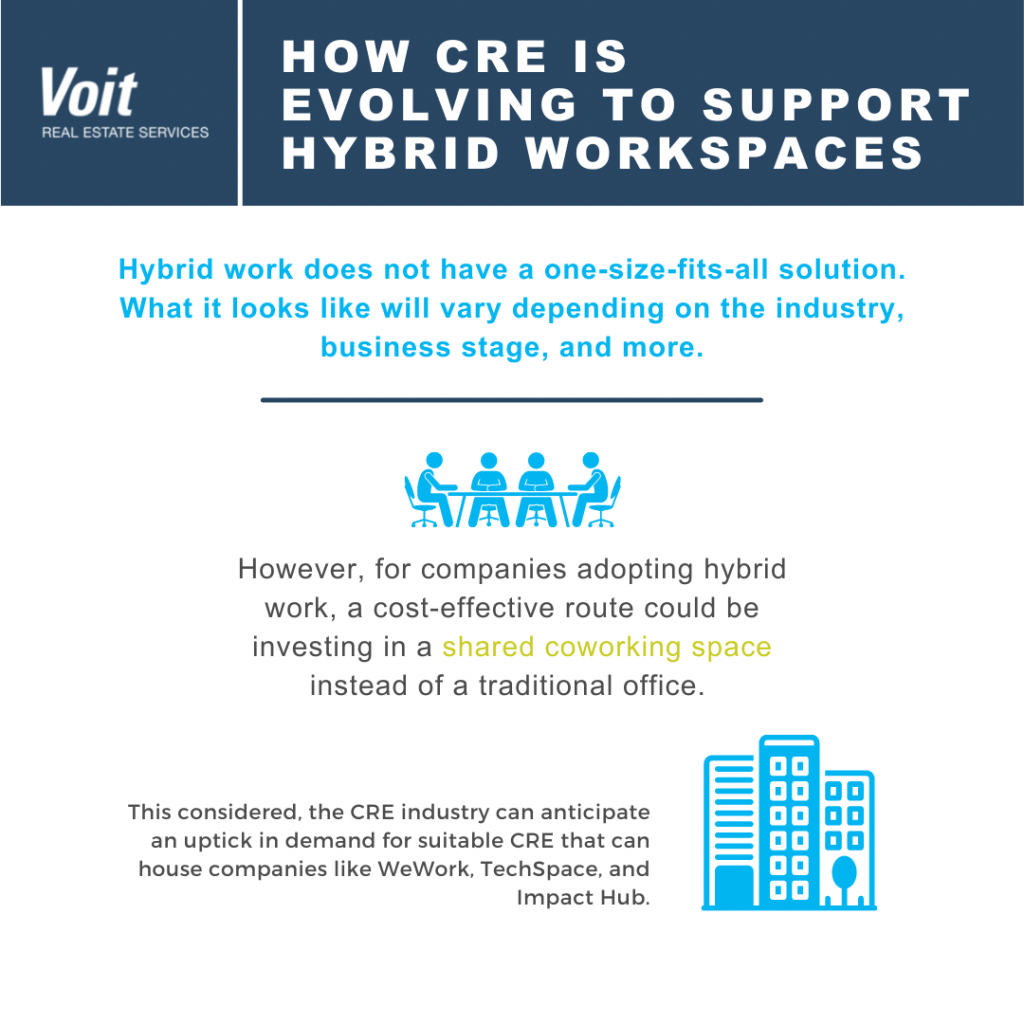
Although many individuals are now permanently working from home, some companies value face-to-face collaboration. Additionally, some jobs are unable to adopt a full work-from-home model.
The solution? A hybrid work model.
Wave goodbye to the traditional, cubicle-style office. Hybrid work is here to stay; the traditional office, not so much.
Let’s talk about how commercial real estate is evolving to support hybrid workspaces. Plus, what this means for CRE, the benefits of hybrid work, and more.
What is Hybrid Work?
“A hybrid work model is a plan that incorporates a mixture of in-office and remote work in an employee’s schedule,” according to Built In. While hybrid work is not for everyone, it’s important to consider as an option as we’ve seen it grow in popularity throughout the COVID-19 global pandemic.
It’s important to note that “there is no one-size-fits-all hybrid model. Each company develops a hybrid model based on the needs of the company and the needs of the individual employee,” according to Built In.

What Are the Benefits of Hybrid Work?
According to Wrike, hybrid work has many benefits, including that it can:
- Lower social isolation
- Increase work-life balance
- Reduce commuting
- Allow for collaboration
- Reduce overhead costs
- Allow opportunity for team building
Although many people are now working fully remote, a 100% work-from-home model is not for everyone. It might be enjoyable for one and dreadful for another. A hybrid model acts as a middle ground and gives you the best of both worlds: at home and in person.
To provide an example, Eric Northbrook, SIOR, Executive Managing Director and Partner at Voit, says remote work really wasn’t for him. There are many benefits to going into the office, even on a hybrid schedule.
The office, according to Harvard Business Review can act as a:
- Social Anchor
- Learning Center
- And a Hub for Unstructured Collaboration
Some people, like Eric, value the collaboration and face-to-face interaction that you receive in an office. Hybrid work provides you with this opportunity.
How CRE is Evolving to Support Hybrid Work
But what do all of these changes have to do with CRE? Well, we all know that commercial real estate doesn’t come cheap. For companies who are adopting hybrid work, the more cost-effective and practical route might be investing in a shared coworking space.
(After all, who wants to be paying rent or a mortgage toward a property their employees only spend a couple of days out of the week at, if that?)
Coworking Spaces
We’ve all heard of WeWork.
Many business owners and individuals might turn to shared coworking spaces, like WeWork, to perfect their business’s hybrid work model. This considered, the CRE industry can anticipate an uptick in demand for suitable CRE that can house companies like WeWork, TechSpace, and Impact Hub.
For CRE investors, “converting commercial space into homey environments and shared mobile workspaces… are tremendous opportunities,” writes RealtyBizNews. Commercial real estate investors, as advised by Forbes, should “keep their eyes on a new iteration of co-working for companies looking to downsize: shared office spaces with partner companies.”
For more on coworking and shared spaces and what hybrid work means for CRE investors, visit our blog “Commercial Real Estate and the Digital Nomad.”
Outdoor Amenities
The amenities and features that individuals want in a commercial building have also changed greatly since COVID-19 hit the United States.
People tend to be more focused on the open office, which allows room for appropriate social distancing measures. In fact, in the last two years especially, we’ve noticed a trend of converting warehouses to office space, which allows for plenty of room to spread out.
Another aspect that CRE is evolving to, hybrid work model or not, is the desire for outdoor amenities within the office. Think gardens, patios, even rooftop decks. Eden Health writes that “spacious, green outdoor areas can provide a welcome break from ‘screen time’ and give staff a place to collect their thoughts.”
There is additionally a “stronger emphasis now on healthy, environmentally sustainable workplaces with plenty of natural ventilation to keep employees well, and make them feel safe and secure.”
CRE investors and developers cannot fail to overlook these changes.
How Much Space Do Hybrid Models Need?
According to WSP, there will be an overall decline in the need for office space. This decrease, however, will vary by industry.
Interestingly enough, although less office space may be needed, companies will need the same amount, if not more space per employee to follow recommended social distancing guidelines.
This article supports the idea that despite hybrid models growing in popularity, there is not a major reduction in the demand for space.
“While some are certainly reconfiguring their offices to take into account employees still planning to work two or three days a week from home, they’re often taking up exactly the same footprint but redesigning it as meeting, conference, and collaboration space – the kind of functions that can’t take place at home.”
Hybrid work, as we mentioned before, does not have a one-size-fits-all solution. What it looks like will vary depending on the industry, business stage, and more.
As we wrote in our article on what the future holds for commercial office space, “the office is not dead, per se, the future of office space, however, is evolving to accommodate work post-COVID.” Read on for more here.